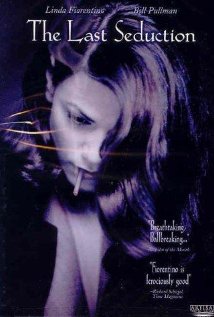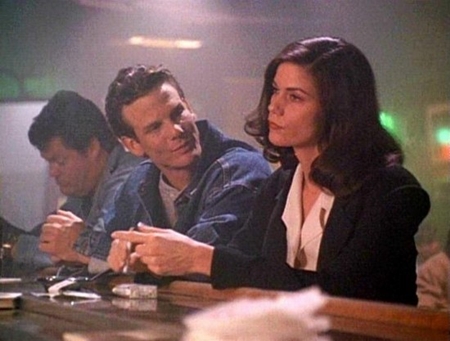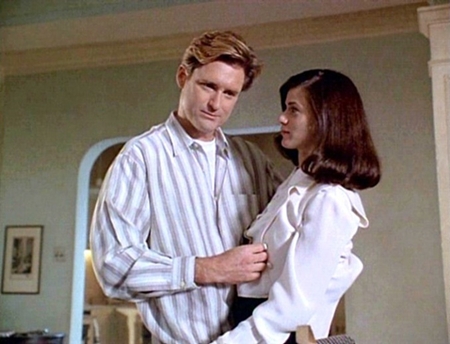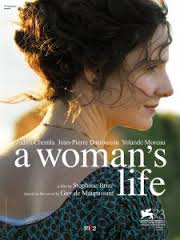“Linda Fiorentino [is] the baddest of the bad women, the most full-blown yet utterly believable femme fatale to come along in years.”
— Mick LaSalle, San Francisco Chronicle
Critic Mick LaSalle was writing about “The Last Seduction” (1994, John Dahl) and if you’ve never seen it, you’d better have a damn good reason!
Angelenos can watch this unforgettable neo-noir on the big screen on Tuesday, Oct. 8, at 7 pm, at the Laemmle Royal Theatre in West Los Angeles. Director John Dahl will be the special guest. In honor of the event, part of Laemmle’s Anniversary Classics Series, we’re rerunning our “Last Seduction” review.
The Last Seduction/1994/ITC/110 min.
 Years ago, I wrote a weekly column for the Chicago Tribune. I interviewed experts on ways women could work smart and climb the corporate ladder. Most of the time, no matter what the obstacle or dilemma was – job hunting, negotiating a raise, getting a promotion – the bottom line was: do your homework, highlight your achievements and ask for what you want.
Years ago, I wrote a weekly column for the Chicago Tribune. I interviewed experts on ways women could work smart and climb the corporate ladder. Most of the time, no matter what the obstacle or dilemma was – job hunting, negotiating a raise, getting a promotion – the bottom line was: do your homework, highlight your achievements and ask for what you want.
In 1994’s “The Last Seduction” by director John Dahl and writer Steve Barancik, Linda Fiorentino as Bridget Gregory takes this advice to dazzling new heights. As the story unfolds, this career maven excels in not just one job, but several. In the opening scene, she’s a supervisor at a telemarketing sales firm in New York City, where she doesn’t ask, she demands. Then she needles her hapless sales guys mercilessly, calling them “maggots, eunuchs and bastards.”
At least they know where they stand. That pat-on-the-back stuff is way overrated.
Later she becomes Director of Lead Generation at an insurance company in a small town in New York state. Under her own steam (at night, of course, this being a noir) she researches prospects for a telemarketing murder business. Hey, it’s not like there isn’t a market.
And she launches an entrepreneurial venture in which she steals a boatload of cash from her husband, malleable Clay (Bill Pullman) and taps loyal-to-a-fault Mike, her lover/investment partner (Peter Berg), to help her. Neither of these dudes is much of a match for her – their chief virtue (besides being good looking) is that they are good at following orders, which is especially true in Mike’s case.
When one of Mike’s friends asks him: “whadd’ya see in her?” he replies: “a new set of balls.” Her résumé also includes legs that never stop, bedroom eyes and a ready laugh, especially at the expense of doofuses or dumpy small-town mores. Just when you think an interfering man is going to impede her climb to the top, she flicks him away like a speck of lint from her sleek pinstripe suit.
Having done her due diligence, she’s hoping to close the deal in such a way that neither Clay nor Mike can claim a penny of the profit. Talk about multi-tasking. It’s understandable that so much juggling might make Bridget a little irritable from time to time.
Luckily, Mike is nothing if not supportive and just turns the other (butt) cheek when she calls him a rural Neanderthal. When he suggests they go on a date and chat sometime; she asks: “What for?”

When Mike (Peter Berg) suggests going on an actual date, Bridget (Linda Fiorentino) asks, “What for?”
To say that Fiorentino, a Philly native with a fiery intensity, nails the part is an understatement. She is one of the fiercest femmes fatales in all of neo-noir moviemaking. If I were a guy, I think seeing this performance would surely give me an uneasy night’s sleep. I would have loved to see Fiorentino work with Quentin Tarantino, but her career short-circuited fairly early. I have heard she was a tad hard to work with – shocker! Pullman, Berg and the rest of the cast more than hold their own, underplaying their parts and letting Fiorentino hold bitchy court.
Director Dahl is a neo-noir specialist (he also directed “Red Rock West,” “Kill Me Again” and “Rounders”) and the sharp, funny script is peppered with references to noir classics. For instance, Dahl tips his hat to “Double Indemnity” by having Bridget and Mike both work at an insurance company and, when Bridget calls the police to falsely accuse a guy of exposing himself (so she can make a getaway), she gives her name as “Mrs. Neff.”
I suppose that could be evidence of her truly tender heart – in her imagination, the doomed lovers Walter Neff and Phyllis Dietrichson get married and live happily ever after. Yeah, right. But, if Bridget said it, you’d believe her.












From FNB readers